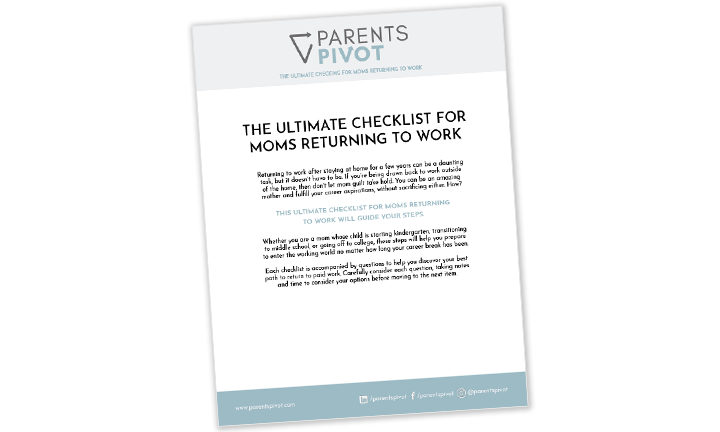Do you know your basic workplace rights? Whether you are considering returning to work or you’ve been working for years, knowing your rights and protections as an employee is vital. Familiarizing yourself with employment laws could save you from wrongful treatment or conditions that are detrimental to your family.
That’s why we are excited to share this valuable resource from Anna’s friend Erica DeReyes at Employee Relations Consulting. If you are a mom in the workforce (or plan to be soon), you need to read this guide. Protect yourself and your loved ones with these top 10 employment laws every employee should know.
Top 10 Employment Laws You Should Know
Here is an overview of some of the important employment laws you should know as a working mom:
*Note: This is general guidance for federal employment laws. States may provide additional protections. Also, some very small employers – less than 15 in TX but varies by state - are not subject to some of these laws. Furthermore, this information is not legal advice but for informational purposes only. If you have a question or concerns in any of these areas, please consult with your HR professional or attorney.
Protected Categories: Under the law, applicants and employees are protected from employment discrimination based on race, color, religion, sex (including pregnancy, sexual orientation, or gender identity), national origin, age (40 and over), disability and genetic information.
Employment at Will: An employer can fire an employee at any time for any reason, unless he/she has a written contract that limits such termination. You cannot be fired for any unlawful reason or one which violates public policy exceptions under the law, if any. If you are a member of a protected category and are terminated because of your protected category, that is discrimination and that is unlawful.
Discrimination: If an individual is treated differently and subjected to any adverse employment action in any aspect of employment, from hiring to promotion to firing, because of their protected category, it is considered discrimination.
Harassment: Harassment becomes unlawful where 1) enduring the offensive conduct becomes a condition of continued employment, or 2) the conduct is severe or pervasive enough to create a work environment that a reasonable person would consider intimidating, hostile, or abusive. Although sexual harassment gets the most attention, harassment because of any other protected category is also unlawful.
The Family & Medical Leave Act: The FMLA provides job protected leave to individuals for the birth/adoption/foster care of a child, an employee’s own, or family member’s serious health condition or military leave. The 3 most important things to know about FMLA: 1. Eligibility: An employer must have 50 employees in a 75 mile radius to be covered by the FMLA. An employee is only covered if they have worked BOTH the last 12 months and 1,250 hours. 2. FMLA provides job protected leave for up to 12 weeks, not income protection. FMLA leave is unpaid under the law – check with your Company to see if they provide any benefits not required by law. 3. You cannot be retaliated against because you took FMLA leave. You must be treated as if you never left. If you would otherwise have been terminated while working, you still can be while on leave (e.g. layoff). RETURNING FROM MATERNITY LEAVE: You must be returned back to your same or similar position.
The Americans with Disabilities Act: The ADA requires employers to provide employees with disabilities with reasonable accommodations to perform the essential functions of a job, unless doing so would impose an undue hardship on the employer. The law is very expansive so many ailments qualify as disabilities. Furthermore, it is important to understand that time off from work may be a reasonable accommodation. If you are new to a job and aren’t eligible for FMLA or you don’t have any paid time off to use, you may be able to request the time off as a reasonable accommodation under the ADA. RETURNING FROM MATERNITY LEAVE: If you have used all 12 weeks of FMLA leave, and you need more time as a result of a disability, you may be able to request additional leave as a reasonable accommodation.
Retaliation: The number one reason employees do not report discrimination or harassment is due to a fear of being retaliated against (fired, demoted or shunned) at work. Employees must understand that the law protects them against retaliation. In the eyes of the law, retaliation is just as bad as the discrimination, harassment or unlawful conduct itself. The law is written to empower employees to report unlawful conduct.
Wage & Hour: If your position is classified as non-exempt, you cannot work off-the-clock, or on your break or during your lunch hour. Also, if non-exempt, you generally must be paid time and a half (1.5x) for any time worked over 40 hours in any workweek. Many employers misclassify employees as exempt instead of non-exempt as the requirements of the Fair Labor Standards Act can be confusing.
Equal Pay Act of 1963: The EPA prohibits sex-based wage discrimination between men and women in the same establishment who perform jobs that require substantially equal skill, effort and responsibility under similar working conditions. Title VII also prohibits gender-based pay discrimination in employment.
Nursing Mothers: Federal law requires certain employers to provide reasonable break time for an employee to express breast milk for her nursing child for one year after the child’s birth each time such employee has need to express the milk. Employers are also required to provide a place, other than a bathroom, that is shielded from view and free from intrusion from coworkers and the public, which may be used by an employee to express breast milk.
Whether you’re a mom currently in the workforce or you plan to return soon, it is crucial that you know your rights. By informing yourself of these employment laws, you’ll be better able to protect yourself and your family’s best interests.
For more help returning to paid work, turn to Parents Pivot! Set up a coaching session with Anna for personalized support in all the ins and outs of pivoting back to work.







